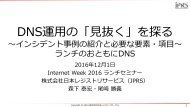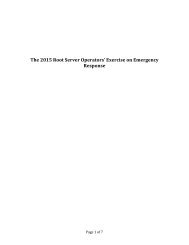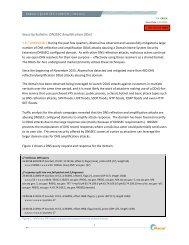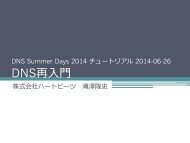Create successful ePaper yourself
Turn your PDF publications into a flip-book with our unique Google optimized e-Paper software.
Executive Summary<br />
Names that belong to privately-defined or “local” <strong>name</strong> spaces oft<strong>en</strong> look like DNS <strong>name</strong>s and<br />
are used in their local <strong>en</strong>vironm<strong>en</strong>ts in ways that are either id<strong>en</strong>tical to or very similar to the way<br />
in which globally delegated DNS <strong>name</strong>s are used. Although the semantics of these <strong>name</strong>s are<br />
properly defined only within their local domains, they sometimes appear in query <strong>name</strong>s<br />
(QNAMEs) at <strong>name</strong> resolvers outside their scope, in the global Internet DNS.<br />
The context for this study is the pot<strong>en</strong>tial <strong>collision</strong> of labels that are used in private or local <strong>name</strong><br />
spaces with labels that are candidates to be delegated as new gTLDs. The primary purpose of the<br />
study is to help ICANN understand the security, stability, and resili<strong>en</strong>cy consequ<strong>en</strong>ces of these<br />
<strong>collision</strong>s for <strong>en</strong>d users and their applications in both private and public settings.<br />
The pot<strong>en</strong>tial for <strong>name</strong> <strong>collision</strong> with proposed new gTLDs is substantial. Based on the data<br />
analyzed for this study, strings that have be<strong>en</strong> proposed as new gTLDs appeared in 3% of the<br />
requests received at the root servers in 2013. Among all syntactically valid TLD labels (existing<br />
and proposed) in requests to the root in 2013, the proposed TLD string home ranked 4 th , and the<br />
proposed corp ranked 21 st . DNS traffic to the root for these and other proposed TLDs already<br />
exceeds that for well-established and heavily-used existing TLDs.<br />
Several options for mitigating the risks associated with <strong>name</strong> <strong>collision</strong> have be<strong>en</strong> id<strong>en</strong>tified.<br />
For most of the proposed TLDs, collaboration among ICANN, the new gTLD applicant, and<br />
pot<strong>en</strong>tially affected third parties in the application of one or more of these risk mitigation<br />
techniques is likely to substantially reduce the risk of delegation.<br />
The pot<strong>en</strong>tial for <strong>name</strong> <strong>collision</strong> with proposed new gTLDs oft<strong>en</strong> arises from wellestablished<br />
policies and practices in private network <strong>en</strong>vironm<strong>en</strong>ts. Many of these were<br />
widely adopted industry practices long before ICANN decided to expand the public DNS root;<br />
the problem cannot be reduced to “people should have known better.”<br />
The delegation of almost any of the applied-for strings as a new TLD label would carry<br />
some risk of <strong>collision</strong>. Of the 1,409 distinct applied-for strings, only 64 never appear in the TLD<br />
position in the request stream captured during the 2012 “Day in the Life of the Internet” (DITL)<br />
measurem<strong>en</strong>t exercise, and only 18 never appear in any position. In the 2013 DITL stream, 42<br />
never appear in the TLD position, and 14 never appear in any position.<br />
The risk associated with delegating a new TLD label arises from the pot<strong>en</strong>tially harmful<br />
consequ<strong>en</strong>ces of <strong>name</strong> <strong>collision</strong>, not the <strong>name</strong> <strong>collision</strong> itself. This study was concerned<br />
primarily with the measurem<strong>en</strong>t and analysis of the pot<strong>en</strong>tial for <strong>name</strong> <strong>collision</strong> at the DNS root.<br />
An additional qualitative analysis of the harms that might <strong>en</strong>sue from those <strong>collision</strong>s would be<br />
Name Collision Study Report Page 2<br />
Version 1.5 2013.08.02







